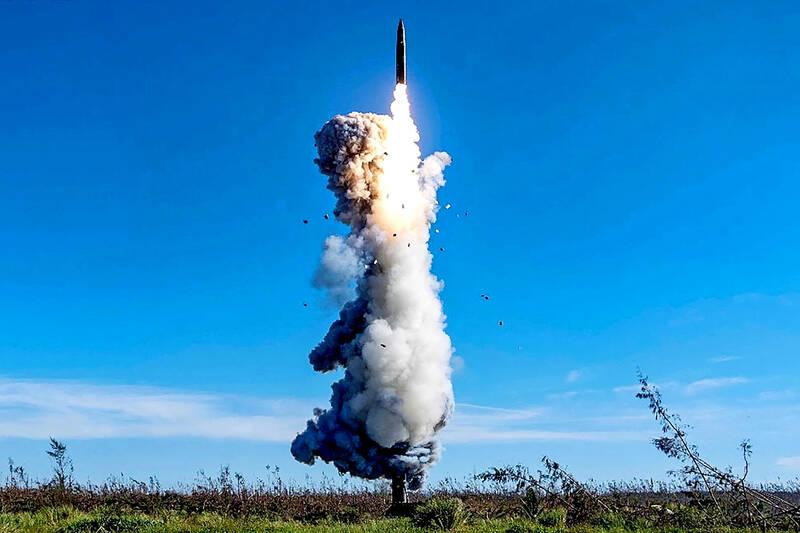The Chinese People's Liberation Army Rocket Force has increased its stockpile by almost 50 percent in four years, to about 3,500 missiles, and missile brigades on China’s east coast have built bigger bases with more launchpads, the New York Times reported yesterday.
This buildup is part of Chinese President Xi Jinping’s (習近平) “ambitions to bring Taiwan under Beijing’s control and counter US power in Asia through the threat of overwhelming force,” authors Chris Buckley and Pablo Robles wrote in the article.
The missile bases are deploying increasingly advanced missiles such as the Dongfeng-17, a maneuverable hypersonic missile, and the Dongfeng-26, nicknamed the “Guam express” for its ability to strike US military bases in that region, the article said.

Photo: Chinese People's Liberation Army News and Communication Center via AFP
Missiles are “the starting point for any type of military coercion campaign that China would use against Taiwan,” said Jennifer Kavanagh, director of military analysis at the research group Defense Priorities.
For China, “having an overwhelming number of missiles is also intended as a political signal — to Taiwan that there’s no point in fighting back, to the US that you can’t intervene,” Kavanagh said in the article.
China relies on its missile arsenal to intimidate Taiwan and its allies during peacetime and would use it to threaten Taiwanese and US forces in the event of a conflict, the New York Times said.
Xi showed his commitment to the Rocket Force, which controls nuclear and conventional missiles, by visiting Brigade 611 in China's Anhui Province last year, the article said.
Satellite images show that Brigade 611, 708km from Taiwan, has doubled in size in the past few years, the article said.
The unit is now deploying Dongfeng-26 missiles, which can be armed with conventional or nuclear warheads, and the Pentagon estimates that China has about 500 of them, it added.
Brigade 616 in China's Jiangxi Province, about 580km from Taiwan, has also grown rapidly and is being prepared for Dongfeng-17 missiles, the article said.
“If there is a Taiwan conflict, particularly if there’s some level of US involvement or the threat of US involvement, then from the start it has a nuclear dimension,” said Kelly Grieco, a senior fellow at the Stimson Center, a Washington-based foreign affairs think tank.
“A system like the Dongfeng-26 makes this potentially even more dangerous,” Grieco said in the article.
Despite these advances, “China’s rapid buildup of its missile systems has not been without problems,” the New York Times said.
According to a Pentagon assessment, corruption in the Rocket Force might have compromised China’s new nuclear missile silos, the article said.
In addition, while China’s missile accuracy has improved, experts question how its missiles would perform in real combat conditions, it said.

US climber Alex Honnold is to attempt to scale Taipei 101 without a rope and harness in a live Netflix special on Jan. 24, the streaming platform announced on Wednesday. Accounting for the time difference, the two-hour broadcast of Honnold’s climb, called Skyscraper Live, is to air on Jan. 23 in the US, Netflix said in a statement. Honnold, 40, was the first person ever to free solo climb the 900m El Capitan rock formation in Yosemite National Park — a feat that was recorded and later made into the 2018 documentary film Free Solo. Netflix previewed Skyscraper Live in October, after videos

Starting on Jan. 1, YouBike riders must have insurance to use the service, and a six-month trial of NT$5 coupons under certain conditions would be implemented to balance bike shortages, a joint statement from transportation departments across Taipei, New Taipei City and Taoyuan announced yesterday. The rental bike system operator said that coupons would be offered to riders to rent bikes from full stations, for riders who take out an electric-assisted bike from a full station, and for riders who return a bike to an empty station. All riders with YouBike accounts are automatically eligible for the program, and each membership account

A classified Pentagon-produced, multiyear assessment — the Overmatch brief — highlighted unreported Chinese capabilities to destroy US military assets and identified US supply chain choke points, painting a disturbing picture of waning US military might, a New York Times editorial published on Monday said. US Secretary of Defense Pete Hegseth’s comments in November last year that “we lose every time” in Pentagon-conducted war games pitting the US against China further highlighted the uncertainty about the US’ capability to intervene in the event of a Chinese invasion of Taiwan. “It shows the Pentagon’s overreliance on expensive, vulnerable weapons as adversaries field cheap, technologically

NUMBERs IMBALANCE: More than 4 million Taiwanese have visited China this year, while only about half a million Chinese have visited here Beijing has yet to respond to Taiwan’s requests for negotiation over matters related to the recovery of cross-strait tourism, the Tourism Administration said yesterday. Taiwan’s tourism authority issued the statement after Chinese-language daily the China Times reported yesterday that the government’s policy of banning group tours to China does not stop Taiwanese from visiting the country. As of October, more than 4.2 million had traveled to China this year, exceeding last year. Beijing estimated the number of Taiwanese tourists in China could reach 4.5 million this year. By contrast, only 500,000 Chinese tourists are expected in Taiwan, the report said. The report